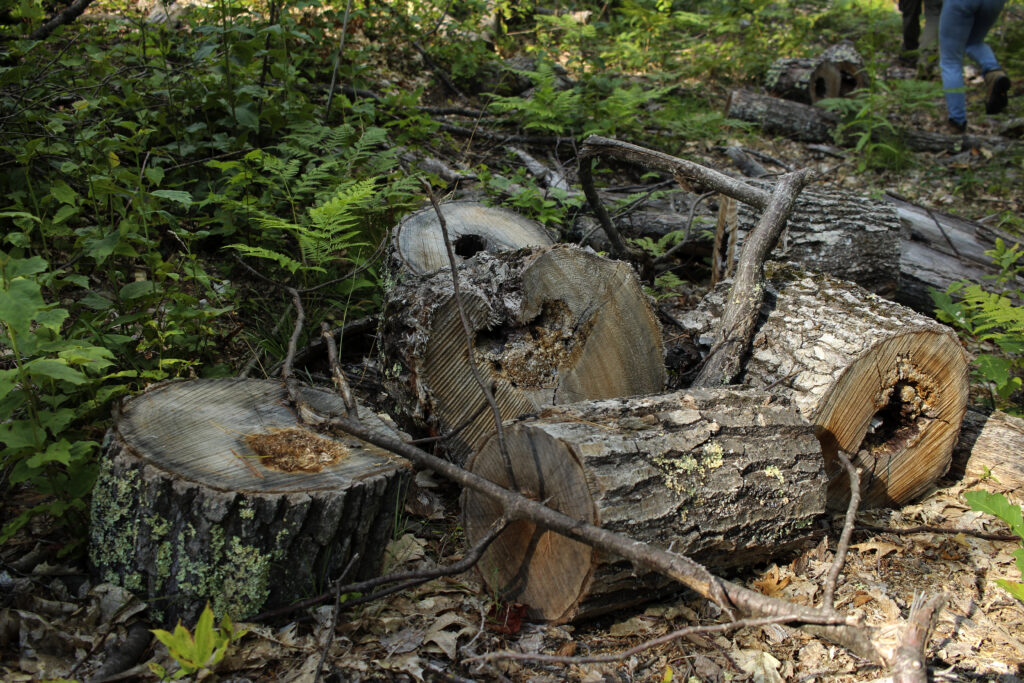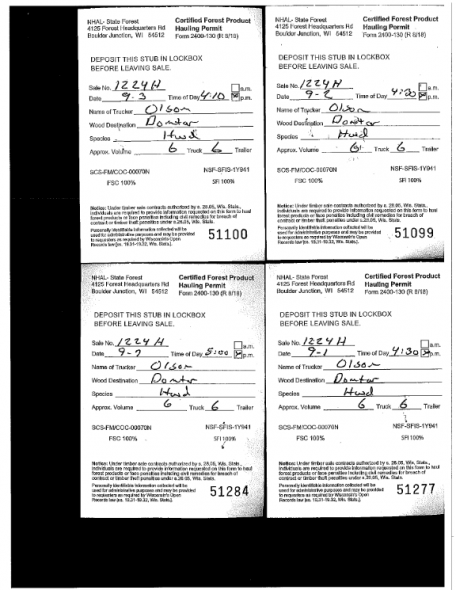Residents Charge DNR Allows Improper Logging on Lakes
Companies logging on north woods lakes in violation of state DNR rules?

Stumps after a harvest near Trout Lake. Photo by Henry Redman, Wisconsin Examiner.
Four companies on a Wisconsin Department of Natural Resources committee developing new logging rules purchased timber from lakes in Northern Wisconsin in which local residents have alleged that those rules are frequently being broken, documents obtained by the Wisconsin Examiner show.
For nearly two years, a group of residents who live and work near the Northern Highland-American Legion State Forest have alleged that the DNR is authorizing the logging of trees too close to lakes.
Vilas County residents Ardis Berghoff and John Schwarzmann have alleged that loggers have been cutting too many trees too close to the shore, which can be harmful to the water, cause erosion and damage the habitats of wildlife that relies on the area.
The DNR has disputed the allegations and several audits of logging in the region have come to differing conclusions. Berghoff and Schwarzmann, who is the former forest supervisor for the Wisconsin Board of Commissioners of Public Lands, have completed their own survey of 15 lakes in the region and found that at nine of them, DNR-approved logging operations violate the BMPs.
The audits were conducted by third-party certification groups. The certification process is an important part of the industry’s efforts to responsibly harvest trees. The DNR and logging companies rely on certification from groups such as the Forest Stewardship Council to confirm that the forestry operations are being sustainably run.
For the first time since 2011, the DNR is working to update the BMPs and has convened a Forestry Best Management Practices Advisory Committee to do so.
The committee’s members include a number of lumber industry employees and after its initial meetings, Berghoff, Schwarzmann and other activists grew concerned that the updated rules would relax the BMP requirements and codify the rule breaking. After a committee meeting in October in which members suggested removing the minimum width required for an RMZ, their fears appeared to be realized.
The duo has called for a halt to all logging within RMZs while the committee works to update the rules.
Logging industry representatives on the committee said that taking such measures would cost the companies too much time and money.
“There is an economic potential and impact to individual loggers that have bid on timber sales,” Bethany Polchowski, a forester for Biewer Lumber, said. “This is their bottom line.”
While industry representatives were worried about halting all work within RMZs as the committee undertakes the years-long process of writing new rules, several of the companies on the committee were purchasing timber from the exact tracts where Berghoff and Schwarzmann have raised alarms, documents show.
 Each time a trucker drives a haul of lumber from a logging site to a purchaser, the trucker is required to fill out a ticket noting where the lumber is from and the company it’s going to. These tickets show that four companies with employees on the committee purchased lumber cut near three of the lakes in Berghoff and Schwarzmann’s survey — Trout, Upper Gresham and Whitney.
Each time a trucker drives a haul of lumber from a logging site to a purchaser, the trucker is required to fill out a ticket noting where the lumber is from and the company it’s going to. These tickets show that four companies with employees on the committee purchased lumber cut near three of the lakes in Berghoff and Schwarzmann’s survey — Trout, Upper Gresham and Whitney.
Environmental advocates say that the companies setting new rules for logging as they purchase lumber from tracts of land with alleged violations of those rules is a “glaring conflict of interest.”
“Timber companies should absolutely not set environmental standards for the timber they buy and sell,” Andy Olsen, a senior policy advocate for the Environmental Law & Policy Center in Madison, said. “It’s a glaring conflict of interest. Timber cut from Wisconsin’s public lands should not count as ‘sustainable’ under these practices. Cutting shoreline forests harms habitat and waters – and sustainability. If they disagree, these companies should provide examples of how they recommended stronger BMPs that run contrary to their financial interest. Let’s see it.”
“We need an independent audit of DNR Forestry,” he added.
From June 2020 to September 2021, Biewer Lumber purchased 12 truckloads of red pine, spruce and hardwood from tracts near Upper Gresham Lake and Whitney Lake.
Over that same time period, the Packaging Corporation of America purchased 93 truckloads of aspen, birch, hardwood and oak from Trout Lake, Upper Gresham Lake and Whitney Lake and Louisiana-Pacific purchased 57 truckloads of aspen, red pine and hardwood from Whitney Lake.
Ahlstrom-Munskjö purchased 76 truckloads of spruce, hardwood, balsam, birch, white pine, red pine from Upper Gresham Lake and Whitney Lake.
Biewer Lumber and the Packaging Corporation of America did not respond to requests for comment. A spokesperson for Ahlstrom-Munskjö said it relies on the outside certification process to make sure its lumber is sourced sustainably.
“As an industry we were asked to participate in an advisory committee specifically designed to address water quality BMPs. When we have purchased timber from a supplier, we require our suppliers to be SFI® certified which in turn qualifies they are adhering to best management practices for water quality,” the spokesperson, Addie Teeters, wrote in an email. “We have adhered to WI DNR standards in all of our business practices, and we are one of the region’s leaders in sustainable forestry practices, maintaining triple Chain of Custody Certification in FSC®, SFI®, and PEFC™ standards. As a sustainably focused business in the state, we appreciate the opportunity to participate in various levels of sustainable forestry management.”
A spokesperson for Louisiana-Pacific also said the certification process has confirmed their lumber is sustainably sourced.
“Our commitment to sustainable forestry is highlighted by our third-party forest certification to independent standards from the Sustainable Forestry Initiative (SFI),” she continued. “To ensure compliance with SFI Fiber Sourcing Standards, timber purchased from the Northern Highland-American Legion (NHAL) State Forest must meet all Wisconsin Department of Natural Resources (DNR) requirements, including those established in the Best Management Practices (BMP) Field Manual. DNR and its third-party forest certification auditors confirmed compliance with BMPs for timber harvested in the NHAL area. The BMPs state that ‘for the purposes of forest management, RMZs are discretionary based on timber stand characteristics, harvest prescription, forester preference, and logger experience.’”
The DNR did not respond to multiple requests for comment.
Companies developing new forestry rules bought timber where the rules were allegedly broken was originally published by Wisconsin Examiner.





















